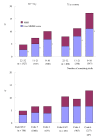Relationship of tooth loss to mild memory impairment and cognitive impairment: findings from the Fujiwara-kyo study
- PMID: 21194415
- PMCID: PMC3024962
- DOI: 10.1186/1744-9081-6-77
Relationship of tooth loss to mild memory impairment and cognitive impairment: findings from the Fujiwara-kyo study
Abstract
Background: This cross-sectional study investigated the relationship between the number of remaining teeth to mild memory impairment (MMI), which is a preclinical stage of dementia, and to cognitive impairment.
Methods: The subjects were aged 65 years or older and were grouped according to their score for the Mini-Mental State Examination (MMSE), the three-word delayed recall test in the MMSE, and the Geriatric Depression Scale into the control group (n = 3,696), the MMI group (n = 121), and the low MMSE score (23 or lower) group (n = 214). We collected data on the number of remaining teeth, the length of the edentulous period, health-related lifestyle, medical history, blood pressure, height, and body weight. Fasting venous blood samples were also obtained.
Results: Multiple logistic regression analysis, adjusted for depressive symptoms, age, sex, length of education, and other explanatory variables, revealed that the odds ratios of 0-10 remaining teeth to 22-32 remaining teeth were 1.679 (95% CI 1.073-2.627) for MMI and 2.177 (95% CI 1.510-3.140) for a low MMSE score. A significant relationship was also found between the length of the edentulous period and the risk of a low MMSE score (odds ratio 3.102, 95% CI 1.432-6.720) (15 years or more/less than 15 years).
Conclusions: Our findings suggest that tooth loss is associated with cognitive function.
Figures


References
-
- Desvarieux M, Demmer RT, Rundek T, Boden-Albala B, Jacobs DR, Papapanou PN, Sacco RL. Relationship between periodontal disease, tooth loss and carotid artery plaque: the oral infections and vascular disease epidemiology study (INVEST) Stroke. 2003;34:2120–2125. doi: 10.1161/01.STR.0000085086.50957.22. - DOI - PMC - PubMed
-
- Gatz M, Mortimer JA, Fratiglioni L, Johansson B, Berg S, Reynolds CA, Pedersen NL. Potentially modifiable risk factors for dementia in identical twins. Alzheimer's & Dementia. 2006;2:110–117. - PubMed
-
- Stein PS, Desrosiers M, Donegan SJ, Yepes JF, Kryscio RJ . Tooth loss, dementia and neuropathology in the Nun study. J Am Dent Assoc. 2007;138:1314–1322. - PubMed
Publication types
MeSH terms
LinkOut - more resources
Full Text Sources
Medical

